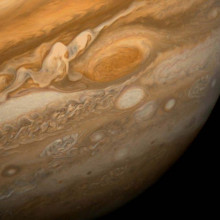How much younger would you be after 50 years on Jupiter?
Could a jaunt to Jupiter be the physics-version of anti-wrinkel cream? This week, Kerstin Göpfrich convinced physicist Dr Stuart Higgins to go on a mission to answer Troy's question...
In this episode

00:00 - What would happen if I moved to Jupiter?
What would happen if I moved to Jupiter?
Kerstin Goepfrich put this question to Dr Stuart Higgins from Imperial College London...
Stuart - Okay, let's go to Jupiter.
Take the next left and proceed for four hundred and eighty-four million miles.
Stuart - Let's speed that up and pretend we could just teleport ourselves directly to Jupiter's gas surface. Jupiter is much bigger than the Earth; it has about three hundred and twenty times the mass - it's huge. Assuming we could live on Jupiter for fifty years and somehow survive the lack of oxygen, giant storms, and the fact that there's no real solid land to stand on, then the strong gravitational field of Jupiter's greater mass would have some peculiar effects.
Crucially, compared to a clock on the Earth, a clock on Jupiter would tick more slowly. According to Einstein's theory of relativity, time passes slower in a gravitational field. This is known as gravitational time dilation.
Kerstin - Being near a massive object makes time move more slowly. So on Jupiter, the big boy of our solar system, how much time would we save? On Facebook Aik suggested a hundred years. One point two three four five minutes was put forward by Martin. Stuart please don't leave me hanging any longer...
Stuart - Well, it's not much. For each second on Jupiter your wristwatch would be running roughly twenty nanoseconds slower than a clock left back on Earth. Over fifty years you'd end up being about thirty-one seconds younger compared to if you'd stayed on Earth. And yes, for general relativity fans, this is very much a simplification, not taking into account loads of other factors but it gives us an idea of the incredibly small size of this effect.
Kerstin - So a lot of effort for thirty-one seconds! But why do we even care about Einstein and all this time dilation?
Stuart - It turns out that even though the differences are tiny, they're big enough to cause huge problems with the global positioning system, GPS. The constellation of GPS satellites that orbit the Earth each have their own clock on board, which broadcasts its signal to receivers, such as your smartphone. By comparing how long it's taken the signal to reach you from different satellites, the system can work out where you are. But there's a problem, the clocks in space are further away from the Earth than your receiver is; they're in a weaker gravitational field. That means after taking into account other effects, time runs faster for the satellites and while the differences are tiny, over a single day it can build up so that your GPS receiver is wrong by a whopping ten kilometres.
Oh dear, I appear to be lost.
Luckily, the satellites have Einstein's equations built in so they account for gravitational time dilation.
- Previous A powerful duo against HIV
- Next Testing, testing










Comments
Add a comment